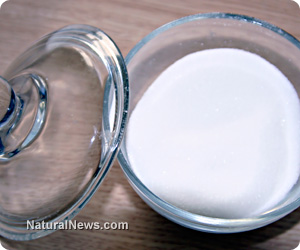
Sugar is the main cause of Type II diabetes, not other factors
Wednesday, March 13, 2013 by: Ethan A. Huff, staff writer
Tags: sugar intake, type II diabetes, factors
- Newly released JFK files reveal Pentagon's role in creating Lyme disease and covid in the same lab
- Analysis: The coming economic collapse, a mass uprising and Trump's three secret weapons to halt the growing revolt
- BIGGEST SCAM: You pay income tax, then taxes on purchases, then personal property tax on what you own that you already paid taxes on with taxed money
- The flu vaccine paradox: Are we making things worse?
- SHOCKER: Find out the REAL REASON that USAID was in AFRICA and other developing nations, and it wasn't for education, health or "democracy"
- BEWARE: USDA allows genetically engineered vaccines to infiltrate organic food production
- Trump nominates VACCINE ZEALOT Susan Monarez to lead the CDC, sidelining RFK Jr.'s reform efforts
- The hidden dangers of antibiotics & 10 natural antimicrobials to incorporate into your life
- Hillary Clinton calls for THOUGHT POLICE, echoing her persistent crusade for censorship
- Big Pharma's media takeover: How drug companies bought the news - and your health
- Obama accused of laundering USAID funds to fuel global protest movements, regime change operations
- Tesla, Elon Musk targeted by same useful idiot domestic terrorists that burned and pillaged American cities in 2020
- Federal government censorship – key nodes, and rabbit holes
- Festive flavors: The sweet history, nutritional profile and health benefits of pecan pie
- Trump reverses course on Gaza plan, says “nobody is expelling Palestinians”
- Heads up! List of food shortages expected in 2025 as the campaign of forced starvation continues to be waged against the American people
- Dr. Mike Yeadon releases 15-minute testimony - WATCH - about genocidal intent of COVID “vaccines”
- Survival 101: Effective EMF blocking techniques
- Elon Musk: Aliens could be here on Earth RIGHT NOW
- EPA advisor admits the agency is funneling billions to climate groups ahead of Trump’s return to White House
- Trump reverses course on Gaza plan, says “nobody is expelling Palestinians”
- Reclaim your health: How midlife exercise reverses years of inactivity
- A lack of integrity in Academia: Harvard professor found GUILTY of fraudulent research to promote CRT theory
- Space war brewing? Russia threatens to destroy Starlink satellites
- Big Pharma's $8 Billion bribery scheme exposed: how doctors are pushed to prescribe junk science, not heal
- Mike Adams Sermon 66: God will DESTROY ISRAEL for its wickedness
- Rep. Nancy Mace introduces bill to ban biological males from female facilities on federal property
- Survival 101: Effective EMF blocking techniques
- 5 Simple steps to boost your brainpower: How to strengthen executive function in a distracted world
- Historian warns Israel may be entering an “IRREMEDIABLE DECLINE”
- Florida takes a stand: DeSantis proposes permanent ban on mRNA vaccine mandates
- RFK Jr.'s SSRI antidepressant investigation sparks liberal meltdown, exposes Big Pharma's dangerous game
- New York politicians push bill allowing governor to indefinitely detain the unvaccinated on a whim
- Sales of survival bunkers rise following Russia’s use of the Oreshnik hypersonic ballistic missile
- Pilots report mysterious lights 'moving at extreme speeds' across Oregon skies
- Newly released JFK files reveal Pentagon's role in creating Lyme disease and covid in the same lab
- EPA advisor admits the agency is funneling billions to climate groups ahead of Trump’s return to White House
- The Health Ranger releases “Vaccine Zombie” song and music video, using AI-animated zombies for the music video
- The pandemic as a tool for INDOCTRINATION: Understanding “The Indoctrinated Brain” by Dr. Michael Nehls
- California's social media censorship law struck down: A victory for free speech or a threat to online safety?
- Dr. Mike Yeadon releases 15-minute testimony - WATCH - about genocidal intent of COVID “vaccines”
- Congratulations to the FULLY UNVACCINATED as you resisted the COVID-19 PROPAGANDA MACHINE fueled by over $100 BILLION
- Mike Adams releases country western hit single: Goin’ Back in Time is Comin’ Home
- RFK Jr. clears key hurdle: Sen. Susan Collins backs controversial HHS nominee, signaling a new era for health policy
- Mike Adams releases music poetry sensation: A Child of God
- Mike Adams releases new song and music video: Nothing More Disgusting Than a Globalist
- Unpacking the Lies That We’ve Been Fed – new song and music video released by Mike Adams, the Health Ranger
- Trump administration takes on global censorship: A new frontier for free speech advocacy
- Florida takes a stand: DeSantis proposes permanent ban on mRNA vaccine mandates
- “Why we influenced the 2020 elections”: Facebook files reveal the coordinated effort to bury the Hunter Biden laptop story
- Ex-FBI Chief EXPOSES disgraceful government coverups of Oklahoma City Bombing, Kennedy assassinations, 9/11 WTC, and "Terrorism" as plot to destroy Constitution
- Michigan sheriff announces criminal investigation into 2020 election crimes, Dominion Voting Systems
- Israeli soldiers accused of even more torture and abuse in the West Bank
- Federal judge backs Trump's mass firings, clearing path for government downsizing
- Red Cross issues warning to stop blood plasma donations from vaccinated people
- Scientists confirm: GENIUS brain function can be spontaneously unleashed in humans without any apparent cause
- EPA advisor admits the agency is funneling billions to climate groups ahead of Trump’s return to White House
- HYSSOP: What research reveals about the health benefits of this ancient holy herb
- Two containers with completed ballots fall out of truck in Florida
- Fully vaccinated about to see “tsunami” of illness and death, warns virologist
- Today I asked our AI language model “Neo” about which phytonutrients or phytochemicals can block the spike protein related to SARS-CoV-2 … Here is what it answered…
- Global leaders unite to clamp down on “misinformation” with UN-backed Cascais Declaration
- BREAKING: 2025 NDAA authorizes mandatory military draft of WOMEN across America… as Pentagon pursues global NUCLEAR war with both Russia and China at the same time
- Michael Yon warns of a ZIONIST TAKEOVER in Trump’s second administration
- BOMBSHELL: DNA testing kits are a SCAM to develop ethnic-specific bioweapons
- Ozempic and Wegovy weight loss drugs are injectable LIZARD VENOM PEPTIDES that may unleash a devastating wave of organ failure… side effects align with symptoms of SNAKE BITES
- Israeli soldiers accused of even more torture and abuse in the West Bank
- These 13 countries just signed an agreement to engineer a global FAMINE by destroying food supply
- NASA admits that climate change occurs because of changes in Earth’s solar orbit, and NOT because of SUVs and fossil fuels
- RFK Jr. clears key hurdle: Sen. Susan Collins backs controversial HHS nominee, signaling a new era for health policy
- Sermon 30: How Jesus reveals Caesar’s FAKE CURRENCY and FALSE AUTHORITY
- Coriander seeds: Ancient medicine backed by modern science
A cohort of researchers examined data on sugar intake and diabetes prevalence in 175 countries, many of which have relatively low obesity rates compared to the U.S. These same researchers then parsed this data, taking into account all potential influencing factors such as types of foods eaten, total calories assimilated, and socioeconomic variables such as aging, living conditions, and income levels. Physical activity levels were also taken into account, as exercise is considered to be a significant factor in diabetes risk.
After carefully adjusting their analysis to account for and exclude these outside factors, as well as meet the stringent standards of the so-called "Bradford Hill" criteria, it was determined that the high availability of sugar in a society is directly linked to increased diabetes prevalence. The more sugar that is available to individuals, in other words, the higher the overall rate of diabetes, while societies with less sugar availability have lower diabetes rates.
"Each 150 kilocalories/person/day increase in total calorie availability related to a 0.1 percent rise in diabetes prevalence (not significant), whereas a 150 kilocalories/person/day rise in sugar availability (one 12-ounce can of soft drink) was associated with a 1.1 percent rise in diabetes prevalence," explains the study, as quoted by The New York Times (NYT).
All forms of refined sugar may be equally threatening, according to study
What this means is that sugar, specifically, is a more significant causative factor in triggering diabetes than mere calorie intake, or even just being overweight or obese. In other words, being overweight or obese in and of itself may not play nearly the same size role that sugar plays in causing diabetes. However, overweight or obesity triggered in large part by excess sugar consumption may be one in the same with excess sugar consumption by a "skinny" person in terms of diabetes risk."No other food types yielded significant individual associations with diabetes prevalence after controlling for obesity and other confounders," adds the study. "Differences in sugar availability statistically explain variations in diabetes prevalence rates at a population level that are not explained by physical activity, overweight or obesity."
What sets this study apart from similar studies conducted in the past is that all influencing factors were taken into account and properly controlled in order to arrive at the most accurate and conclusive findings possible. According to Rob Lustig, a pediatric endocrinologist at the University of California, San Francisco (UCSF) and one of the study's four primary authors, it would be virtually impossible to construct a study more accurate and robust.
"You could not enact a real-world study that would be more conclusive than this one," Lustig is quoted as saying to NYT.
Interestingly, this particular study did not find any major disparities in diabetes risk among types of sugar consumed, whether it be genetically-modified (GM) beet sugar, traditional cane sugar, or high-fructose corn syrup (HFCS). Many processed foods that contain refined flours and white rice, for instance, may also be high-risk when it comes to diabetes, as these quickly turn into basic sugars inside the body after consumption.
Sources for this article include:
http://www.motherjones.com
http://opinionator.blogs.nytimes.com/2013/02/27/its-the-sugar-folks/
Sugar intake at FETCH.news
Get independent news alerts on natural cures, food lab tests, cannabis medicine, science, robotics, drones, privacy and more.
Take Action: Support Natural News by linking to this article from your website
Permalink to this article:
Embed article link: (copy HTML code below):
Reprinting this article:
Non-commercial use OK, cite NaturalNews.com with clickable link.
Follow Natural News on Facebook, Twitter, Google Plus, and Pinterest
Science News & Studies
Medicine News and Information
Food News & Studies
Health News & Studies
Herbs News & Information
Pollution News & Studies
Cancer News & Studies
Climate News & Studies
Survival News & Information
Gear News & Information
News covering technology, stocks, hackers, and more



"Big Tech and mainstream media are constantly trying to silence the independent voices that dare to bring you the truth about toxic food ingredients, dangerous medications and the failed, fraudulent science of the profit-driven medical establishment.
Email is one of the best ways to make sure you stay informed, without the censorship of the tech giants (Google, Apple, Facebook, Twitter, YouTube, etc.). Stay informed and you'll even likely learn information that may help save your own life."
–The Health Ranger, Mike Adams













































